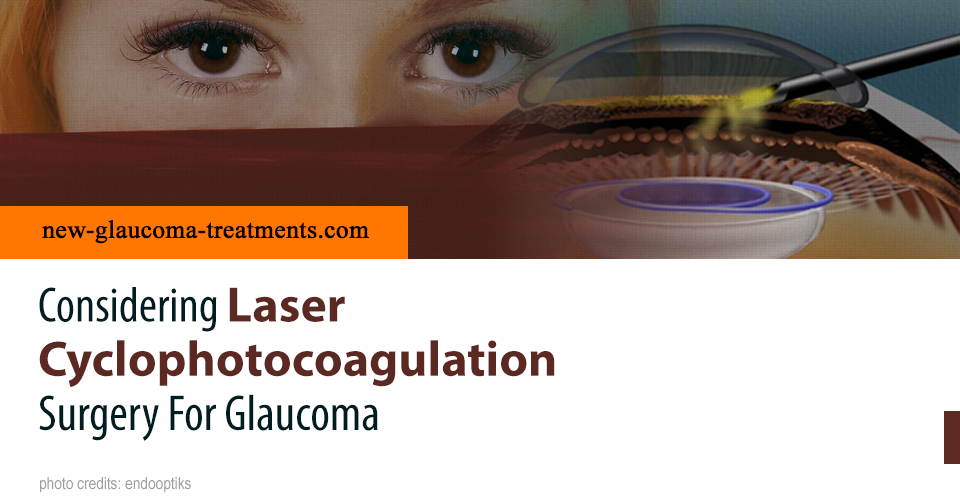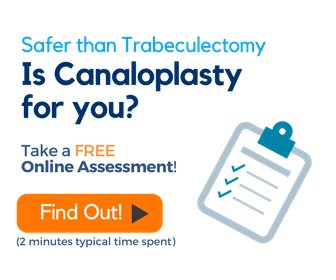
Who Should Consider Endocyclophotocoagulation (ECP)?
Endocyclophotocoagulation (ECP) makes the most sense for those who fit all of the following criteria:
![]() Have mild to moderate glaucoma
Have mild to moderate glaucoma
![]() Currently require eye drops to treat glaucoma
Currently require eye drops to treat glaucoma
![]() Have a visually significant cataract for which cataract surgery is planned
Have a visually significant cataract for which cataract surgery is planned
![]() The surgeon has access to and experience with ECP
The surgeon has access to and experience with ECP
![]() Insurance covers the procedure
Insurance covers the procedure
If you meet all five of the criteria then it’s likely that ECP would be a reasonable glaucoma treatment option.
Who Should Consider Glaucoma Treatments other than ECP?
Endocyclophotocoagulation (ECP)is unlikely to be the best option for those who fit any of the following criteria:
Have advanced/severe/end-stage glaucoma
Those with advanced glaucoma generally require IOP reductions beyond what ECP can be expected to offer. If the IOP is not well controlled then procedures such as trabeculectomy with Mitomycin-C (MMC), glaucoma drainage devices, or even non-penetrating surgeries such as canaloplasty would be more appropriate treatment options.
Have well-controlled glaucoma without the need for glaucoma medications
If one’s glaucoma is well-controlled without the use of medications then there would be no need for additional surgical treatment such as ECP.
Do not have a visually significant cataract for which cataract surgery is planned
The natural lens is very sensitive to touch. Basically anything that bumps into it (other than the iris) results in the development of a cataract. Because the ECP probe must pass over the lens to get to the ciliary processes it could result in the creation of a cataract during the ECP procedure. As such, ECP is not recommended for those who still have their natural lens unless the lens has a cataract and cataract surgery will be done at the same time as ECP.
The surgeon has niether access to nor experience with ECP
If your surgeon has access to and experience with ECP then great! This may be an option for you. If your surgeon has neither access to nor experience with this procedure, however, there is no great need to search out another surgeon. Why? Because there just isn’t enough high quality data on this procedure to highly recommend it. Additionally, there are now many other procedures including non-penetrating surgeries such as canaloplasty as well as a growing number of “minimally invasive glaucoma surgeries” (MIGS) that appear to work at least as well, if not better than, ECP.
Your insurance does not cover Endocyclophotocoagulation (ECP)
There are glaucoma surgical options that can be worth paying out of pocket to have. Generally such procedures would be both safer and more effective than other options. One would also expect long-term IOP lowering when using one’s own funds to pay for a glaucoma procedure. Without solid evidence of long-term benefit it would be hard to justify spending one’s hard-earned funds on ECP.
Summary of Endocyclophotocoagulation (ECP)
Cyclophotocoagulation is the only surgical procedure with the goal of reducing the production of fluid in the eye. Transscleral Cyclophotocoagulation (TCP) appears to work well but is associated with too many serious risks for it to be an option for any but the worst “refractory” glaucomas. Endocyclophotocoagulation (ECP), on the other hand, appears to be a much safer option than TCP but with only a modest (or at least somewhat unpredictable) IOP lowering benefit.
There simply are not enough high quality ECP studies to make a solid conclusion about its role in glaucoma treatment. However, for those with mild to moderate glaucoma anticipating cataract surgery, ECP is one of many glaucoma treatment options (including canaloplasty and MIGS) that are reasonable to consider having at the time of cataract surgery.

David Richardson, MD
Medical Director, San Marino Eye
David Richardson, M.D. is recognized as one of the top cataract and glaucoma surgeons in the US and is among an elite group of glaucoma surgeons in the country performing the highly specialized canaloplasty procedure. Morever, Dr. Richardson is one of only a few surgeons in the greater Los Angeles area that performs MicroPulse P3™ "Cyclophotocoagulation" (MP3) glaucoma laser surgery. Dr. Richardson graduated Magna Cum Laude from the University of Southern California and earned his Medical Degree from Harvard Medical School. He completed his ophthalmology residency at the LAC+USC Medical Center/ Doheny Eye Institute. Dr. Richardson is also an Ambassador of Glaucoma Research Foundation.


